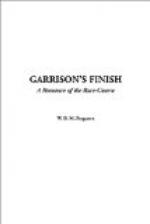“Aw, sneeze!” said Crimmins savagely. Then he checked himself. “It ain’t my game. I only knew the man. There’s nothing in it for me. Suit yourself;” and he shrugged his shoulders. “It ain’t Crimmins’ way to hump his services on any man. Take it or leave it.”
“You wanted me to go crooked, Dan,” said Garrison steadily. “Was it friendship—”
“Huh! Wanted you to go crooked?” flashed the trainer with a sneer. “What are y’ talking about? Ain’t yeh a welcher now? Ain’t yeh crooked—hair, teeth, an’ skin?”
“You mean that, Dan?” Garrison’s face was white. “You’ve trained me, and yet you, too, believe I was in on those lost races? You know I lost every cent on Sis—”
“It ain’t one race, it’s six,” snorted Crimmins. “It’s Crimmins’ way to agitate his brain for a friend, but it ain’t his way to be a plumb fool. You can’t shoot that bull con into me, Bud. I know you. I give you an offer, friend and friend. You turn it down and ’cuse me of making you play crooked. I’m done with you. It ain’t Crimmins’ way.”
Billy Garrison eyed his former trainer and mentor steadily for a long time. His lip was quivering.
“Damn your way!” he said hoarsely at length, and turned on his heel. His hands were deep in his pockets, his shoulders hunched as he swung out of the stable. He was humming over and over the old music-hall favorite, “Good-by, Sis”—humming in a desperate effort to keep his nerve. Billy Garrison had touched bottom in the depths.
CHAPTER II.
The heavy hand of fate.
Garrison left Long Island for New York that night. When you are hard hit the soul suffers a reflex-action. It recoils to its native soil. New York was Garrison’s home. He was a product of its sporting soil. He loved the Great White Way. But he had drunk in the smell, the intoxication of the track with his mother’s milk. She had been from the South; the land of straight women, straight men, straight living, straight riding. She had brought blood—good, clean blood—to the Garrison-Loring entente cordiale—a polite definition of a huge mistake.
From his mother Garrison had inherited his cool head, steady eye, and the intuitive hands that could compel horse-flesh like a magnet. From her he had inherited a peculiar recklessness and swift daring. From his father—well, Garrison never liked to talk about his father. His mother was a memory; his father a blank. He was a good-looking, bad-living sprig of a straight family-tree. He had met his wife at the New Orleans track, where her father, an amateur horse-owner, had two entries. And she had loved him. There is good in every one. Perhaps she had discovered it in Garrison’s father where no one else had.




